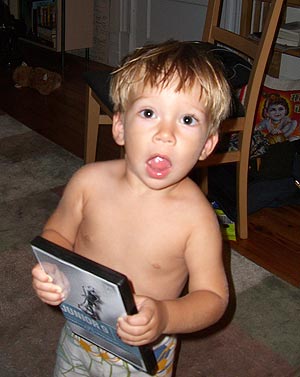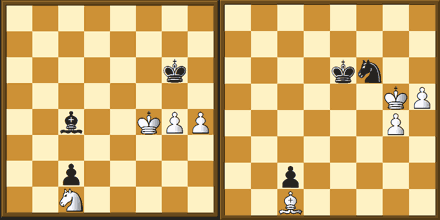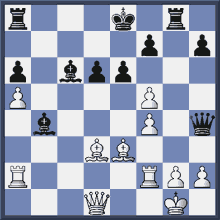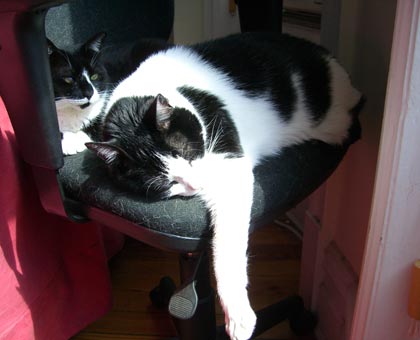A record breaking 150 teams in the Olympiad makes it impossible to cover the event in any comprehensive fashion so I will restrict myself to the impressions I gathered while serving as the US Team Captain for the seventh time, the first since 1996.
The US team of Gata Kamsky, Alex Onischuk, Hikaru Nakamura, Ildar Ibragimov, Gregory Kaidanov and Varuzhan Akobian did not enter the event in an optimal state. A combination of waiting to select the team until after the US Championship, delays in the USCF office, a last minute appeal for eligibility by GM Jaan Ehlvest (who recently changed his federation to the US), visa problems, funding issues and having to make travel arrangements less than a month before the event were not ideal preparations. While several other contending teams were holding formal training camps the US team improvised with some members getting together privately.
Ideally the US team would have arrived in Turin a few days early to adjust to their new surroundings and jet lag but this luxury has never been built into an US Olympiad budget and 2006 was not an exception. As is typical for US teams in this situation we started slowly with a 2.5-1.5 win over New Zealand. Our alertness was not helped by the fact that the accommodations in Turin could best be described as a cross between college dorm and youth hostel. Some readers might remember that some of the athletes in the Winter Olympics, who were housed in the same Village, complained about their accommodations. Well, it's all relative. We had the same Village, but minus the refrigerators, phones, televisions, DVD lounges, Calling Centers, laundry facilities and gyms that were taken out of the complex sometime in the past few months.
Me, I would have just been happy with a table lamp and desk in the room plus a regular supply of hot water. FIDE officials (the Verification Committee!?) said that the organizers had duped them by showing them the facility in February during the Winter Olympics and then changing the agreement. It sounds plausible but FIDE said the same thing about Mr. Touze the organizer of last years World Youth fiasco in Belfort. My impression, having seen the rooms and experienced the food arrangements where portion size was tightly controlled (think Jenny Craig on steroids), was that the city of Turin was probably way over budget after the Winter Olympics and just didn't have the money to do things the way they might have liked. Certainly the many volunteers at the Olympiad did their best to make things run well as possible and one hates to write anything negative after their hard efforts. One question that was not resolved was whether the Turin organizers had to pay FIDE $300,000 for the right to organize the Olympiad. I consulted two influential FIDE insiders, Morton Sand of Norway and Ignatius Leong of Singapore, but received different answers. Sand said the Italians did pay the money and Leong that the fee requirement would first take effect in 2008 in Dresden.
The US followed up it's round one victory over New Zealand with a 3.5 -.5 win over Morocco, which, led by GM Hamdouchi, had defeated second seeded India 3-1 in an opening round stunner. Gata, who had finished second in Sofia, joined us after round two. We had all thought he would want a rest for a few more rounds after battling 2750 opposition in Bulgaria for ten rounds, but this was not the case. The result was some strange color sequences as Alex started with five Whites and Gregory four Whites from five games as Gata, Hikaru, Ildar and Varuzhan did the heavy lifting with Black. This turned out to be a pretty successful strategy for two reasons. One being that Alex and Gregory were winning a lot and two that no one complained. On many teams captains pretty much have to alternate colors to keep players happy but for the US team in Turin the bottom line was what would bring us the most points.
The first free day was after round five and we used the remaining days before it to good effect knocking off the Philippines (2.5-1.5), Poland (3-1) and Georgia (2.5-1.5). The latter two victories looked to be against potential top ten finishing team as both countries players were all under 25 and around 2600. A word about the time control - it was the brutal FIDE special of Game in 90 minutes with a 30 second increment. This is not a time control for those with heart conditions and yes there were a lot of botched endgames in Turin. The organizers had initially listed the time control as 40/90 followed by G/30 with 30 seconds increment from move one, but Chief Arbiter Geurt Gijssen made it emphatically clear at the Captains Meeting that there would be no discussion of changing the time control. Interestingly he was much more flexible when it came to the question of whether to use accelerated pairings. For reasons never made completely clear this Olympiad was only 13 rounds instead of the usual 14 for only the second time in history. Missing the extra round the pairing committee decided to use accelerated pairings and raised the issue two months before the Olympiad with the FIDE Executive Board which rubber stamped the idea. Unfortunately no one bothered to notify the federations of FIDE and the announcement to modify the pairings was a bombshell at the Captains Meeting. Gijssen wisely took note of the strong sentiment against the modification that would have eliminated many of the David versus Goliath pairings that make the Olympiad that much more memorable for some of the smaller members of FIDE.
The first free day was the first opportunity to really see Turin. The Olympic Village was set in the blue-collar Lingotto district of Turin where Fiat once had a giant factory. While the area was not bad there wasn't that much to do in the neighborhood of high rise apartments. Accordingly many of the US team members took advantage of the opportunity to walk along the Po river for a few miles and check out the nice downtown. One couldn't help but wish the Village had been a little closer to civilization.
The second third of the event saw the US continuing a steady move toward the top tables. A victory over China by 2.5-1.5 was typical of the US team at this point in the event in that we were leaving a lot of half points in every match. Fortunately this situation was rectified the last few rounds when we became extremely opportunistic grabbing every draw and win in sight. Going 2-2 in round seven with Sweden was a bit of a disappointment but they turned out to be an over-achieving team in the end, finishing in the top 20. The next day we bounced back with a good 3-1 victory over Denmark and seemed poised to advance to board one with one more match victory but the next two days, playing the Czechs and French, we went 2-2. Knowledgeable chess fans already are familiar with the name of David Navara but also take note of Viktor Laznicka. These two youngsters carried the Czech team which played at the top almost the entire event. The 2-2 score with France was cause for celebration on the US team as we trailed .5-1.5 and seemingly were losing the two remaining games. Miracle number one came from Ildar, who completely outplayed French 2600 Christian Bauer. Miracle number two came when Hikaru drew a two pawn down ending. That evening at a reception arranged by one of the team sponsors, the Internet Chess Club, the US was in good spirits.
Before the final three rounds there was one other free day but the US team couldn't relax entirely because we knew the Russian team would be our next opponent. Kramnik, Svidler, Grischuk, Morozevich, Bareev and Rublevsky were everyone's pick to win going in but by the time we faced them they had lost several matches. Unfortunately for us, the chief cause of the troubles, Rublevsky, had been benched for the event after going 0-0-0. We would not get him in the lineup and the last US victory over Russia was twenty years before. Things were tense throughout with both teams probably able to say at some point in the match they were winning. In the end the US team did the job 2.5 - 1.5 with Hikaru beating Grischuk. Much of the tournament Hikaru had been around 50 percent, getting promising positions but never being able to put away his opponents. This match marked the end of the drought.
Going into the 12th round the US was just outside of the medals. One might have expected more as the team was one of only a handful (France and Armenia the others) that had not lost a single match. Unfortunately there were so many strong teams we had not been able to separate ourselves. Facing the 6th seeded Israeli team (we were seeded 7th) our plan was to try to win the final two matches and hope for the best. Such was not to be as we lost 2.5-1.5. The one bright spot was Hikaru's tough win over the Israeli third board GM Sutovsky. That evening we anxiously awaited our last round pairing. Having lost in round 12 we had our backs to the wall but a big score in the final round could still make things right. Finally it was announced we would play Norway. One hesitates to call a team that can field four GMs, including a 15-year-old kid playing 2800 chess in the Olympiad, a good pairing but relatively speaking it was.
We knew we needed 3.5 from 4 but how to get the points? Clearly the Russian last round defeat of China in the last World Team Championship was cause for study and inspiration. There was no way to "order up" 3.5 points but the team felt that if we could get four complicated games from the opening there was cause for hope. That was actually what happened the next morning (all games were played at 3pm except the last round, which started at 10am). Several hours in Gata, playing White but with nothing in the position and being substantially down on the clock had to make a draw. Now we had to go three for three and that is exactly what happened with first Alex, then Hikaru and finally Varuzhan winning. Just scoring 3.5 was not enough. We also needed Israel to beat Russia or the Netherlands to beat China. Going in the latter seemed a better hope but in the end it was the Israelis who stunned Russia 3-1 winning both bottom boards. This left us in a tie with Israel for third but the comfortable winner on tiebreaks. The Israeli team was seemingly two teams in Turin. Ten rounds into the event they seemed destined for an uneventful placing having lost to the Czech Republic 3-1 and having drawn with Peru 2-2 despite Gelfand beating Granda, but the last three rounds they beat India, USA and Russia by 3-1, 2.5-1.5, and 3-1 - quite impressive but also indication they the first two thirds of the event they had not faced super strong opposition as their final tiebreak was not so good.
The US effort was a total team success. Unlike many of the other top teams we didn't have one massive star like the Chinese with Wang Yue scoring over 1/3 of his teams points. By rating performance our big three of Alex (our only undefeated player), Gata and Hikaru had performances from 2740 to around 2700. Gata was "only" plus one but faced brutally strong opposition on top board - enough so that he actually gained rating points. I am sure after playing ten rounds in Sofia and another ten in Turin in not much more than three weeks that he is sleeping well now! Having Gata not only gave us a first board like no other in recent US Olympiad history but also allowed all the other team members to drop down one notch.
Last Olympiad and in the World Team Championship Alex showed he is a fine first board but in Turin on board two was a steady point scorer and a threat to any board two in the event. Ditto for Hikaru on three. This was Hikaru's first Olympiad and it took him awhile to get used to things but once he did the results speak for themselves. He went 3-0 down he stretch numbering Grischuk and Sutovsky among his victims.
As mentioned before Ildar started with four Black's in his first five games but he never complained. His win over 2600 GM Kempinski in round 4 was one of the smoothest in the Olympiad but it was his defeat of Bauer in round 10 that might have been our most crucial victory in the event.
Gregory has been a standard bearer for US team for over a decade and is the only US player in his 40s still on the team. Two years before in Calvia Gregory was the top scorer for the team and here his "plus three" score and veteran leadership made him again a valuable contributor.
Last but certainly not least Varuzhan was another total team player. Each day we had only 4 spots to fill and six players to fill them with but Varuzhan would prepare for and show up for the matches as if he were playing every day. Varuzhan had not been in the lineup for three rounds before he played the final match but his teammates had total faith he would get the job done and he did!
I have written of my experiences as Captain of the US team but I would be remiss if I did not mention the excellent performance of our women's team of Anna Zatonskih, Irina Krush, Rusa Goletiani and the MI's Camille Baginskaite with Yury Shulman as Captain. Their fourth place finish was the second highest ever by a US team. They were always among the top countries and lost only one match to Ukraine. Good job!
Last and not least I would like to thank the sponsors of he US Olympiad teams that made our participation possible. The Kasparov Chess Foundation was the title sponsor with assistance from the United States Chess Federation, the Internet Chess Club and many individual donors. Thank you.
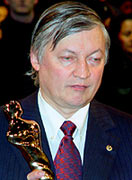 The biggest laugh in the post-event press conference with the two K's came as a surprise to the speaker. When asked how he had prepared for the match, Karpov earnestly began, "I spent a few days in Kansas..." and was interrupted by laughter and amused applause from the crowd.
The biggest laugh in the post-event press conference with the two K's came as a surprise to the speaker. When asked how he had prepared for the match, Karpov earnestly began, "I spent a few days in Kansas..." and was interrupted by laughter and amused applause from the crowd.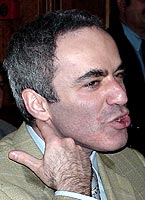 At 10am GMT, the Salt Lake Tribune ran a financial news service report stating that Garry Kasparov is being sued by First International Bank of Israel. Story is
At 10am GMT, the Salt Lake Tribune ran a financial news service report stating that Garry Kasparov is being sued by First International Bank of Israel. Story is 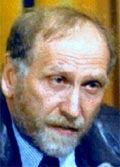 Last I heard, the match was going to be in Reykjavic, Iceland, the site of their famous 1972 world championship match. But Fischer was demanding live, uncensored TV time and that wasn't going to happen. Considering the X-rated radio interviews he's given in the past few years, that's no surprise. (Including one gleefully celebrating 9/11 the day after it happened.) The great Bobby has been using his chess fame to get media time to promote his virulent anti-Semitic (and now anti-American) ranting.
Last I heard, the match was going to be in Reykjavic, Iceland, the site of their famous 1972 world championship match. But Fischer was demanding live, uncensored TV time and that wasn't going to happen. Considering the X-rated radio interviews he's given in the past few years, that's no surprise. (Including one gleefully celebrating 9/11 the day after it happened.) The great Bobby has been using his chess fame to get media time to promote his virulent anti-Semitic (and now anti-American) ranting.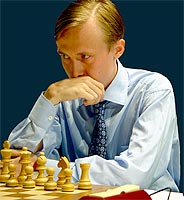 No news is bad news when it comes to chess reunification. Last heard, FIDE champion Ruslan Ponomariov was still insisting on getting draw odds in his match with Kasparov tentatively scheduled for next Spring. He may just be holding out for more cash, something he has done several times already. (Linares and Prague 02)
No news is bad news when it comes to chess reunification. Last heard, FIDE champion Ruslan Ponomariov was still insisting on getting draw odds in his match with Kasparov tentatively scheduled for next Spring. He may just be holding out for more cash, something he has done several times already. (Linares and Prague 02) Garry's mother and personal manager, Klara Kasparova, said that Garry will be making a statement on the matter soon. I think he would love to be able to walk completely clear of KCO and start from scratch with
Garry's mother and personal manager, Klara Kasparova, said that Garry will be making a statement on the matter soon. I think he would love to be able to walk completely clear of KCO and start from scratch with 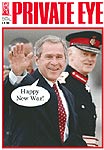 Some fresh dirt from the UK. Private Eye magazine had a lot of fun exposing GM Ray Keene and BrainGames.net and their various legal and financial shenanigans. Keene and BGN handed off to the UK Einstein Group, apparently telling them they had rights to Kramnik and Kasparov. Oops, just Kramnik as it turned out. But that's a separate lawsuit... Anyway, Private Eye didn't have to worry about getting bored and recently wrote that some of the $400,000 in prize money for the July, 2002 Dortmund candidates tournament partially organized/sponsored by Einstein has not been paid to the players.
Some fresh dirt from the UK. Private Eye magazine had a lot of fun exposing GM Ray Keene and BrainGames.net and their various legal and financial shenanigans. Keene and BGN handed off to the UK Einstein Group, apparently telling them they had rights to Kramnik and Kasparov. Oops, just Kramnik as it turned out. But that's a separate lawsuit... Anyway, Private Eye didn't have to worry about getting bored and recently wrote that some of the $400,000 in prize money for the July, 2002 Dortmund candidates tournament partially organized/sponsored by Einstein has not been paid to the players. According to the magazine, the extra pile of money French culture patron Madame Ojjeh (who could fill a few DD sections on her own, but that's not the topic today) kicked in was sent to Einstein, but not all of it has reached the players. From "Private Eye": "One of them, the Bulgarian grandmaster Topalov, complained to the French grandmaster Joel Lautier, a member of Madame Ojjeh's club in Paris. Ojjeh was "furious" to learn that Einstein hadn't already dished out the loot: Topalov was paid shortly afterwards." Let's hope that any remaining obligations are taken care of quickly.
According to the magazine, the extra pile of money French culture patron Madame Ojjeh (who could fill a few DD sections on her own, but that's not the topic today) kicked in was sent to Einstein, but not all of it has reached the players. From "Private Eye": "One of them, the Bulgarian grandmaster Topalov, complained to the French grandmaster Joel Lautier, a member of Madame Ojjeh's club in Paris. Ojjeh was "furious" to learn that Einstein hadn't already dished out the loot: Topalov was paid shortly afterwards." Let's hope that any remaining obligations are taken care of quickly.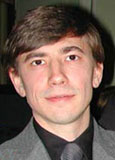 Speaking of supertournaments, Wijk aan Zee starts on January 10. The annual beer and pea-soup festival will be without Kasparov for the second consecutive year after he won three straight. Last year he was sick; this year he'll be playing the program Deep Junior in New York. Kramnik wasted his entire 2001 waiting for his Fritz match, was it worth it? Now we lose 13 Kasparov games for six against a computer nobody will care about the day after. I'm starting to look forward to the day when computers are so strong humans won't have to waste their time playing them. Give it five years.
Speaking of supertournaments, Wijk aan Zee starts on January 10. The annual beer and pea-soup festival will be without Kasparov for the second consecutive year after he won three straight. Last year he was sick; this year he'll be playing the program Deep Junior in New York. Kramnik wasted his entire 2001 waiting for his Fritz match, was it worth it? Now we lose 13 Kasparov games for six against a computer nobody will care about the day after. I'm starting to look forward to the day when computers are so strong humans won't have to waste their time playing them. Give it five years.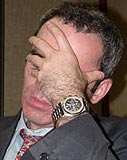 ChessBase has some documents detailing the latest developments in the First International Bank of Israel's lawsuit against Garry Kasparov. As I conjectured below, (DD 7, 11) they were trying to go after Kasparov instead of the company KasparovChess Online although the loan in question was made to KCO. They're after the Kasparov name and "brand" since those are the only things left of any value. It's been kicked out of a US court. (KCO is incorporated in Delaware for tax reasons, like millions of other companies.) Kasparov's lawyer
ChessBase has some documents detailing the latest developments in the First International Bank of Israel's lawsuit against Garry Kasparov. As I conjectured below, (DD 7, 11) they were trying to go after Kasparov instead of the company KasparovChess Online although the loan in question was made to KCO. They're after the Kasparov name and "brand" since those are the only things left of any value. It's been kicked out of a US court. (KCO is incorporated in Delaware for tax reasons, like millions of other companies.) Kasparov's lawyer  My last toilet chess reference (for now) is from the Kramnik-Deep Fritz Bahrain match. Kramnik had a rest area with a well-stocked fridge, a sofa, and a nice fruit basket. Every room in the complex was labeled, and they had put "Kramnik's Rest Room" on this one, although there wasn't a toilet. I guess it was true, literally. Anyway, I thought it was funny and when the match was over I grabbed it off the door as a souvenir. It now adorns my bathroom door (just in case Vlady stops by). Posing in the picture is one of my cats, Bagley (from Argentina). What do you mean photos of my bathroom are too much information?!? This is the Daily Dirt, not the Economist!
My last toilet chess reference (for now) is from the Kramnik-Deep Fritz Bahrain match. Kramnik had a rest area with a well-stocked fridge, a sofa, and a nice fruit basket. Every room in the complex was labeled, and they had put "Kramnik's Rest Room" on this one, although there wasn't a toilet. I guess it was true, literally. Anyway, I thought it was funny and when the match was over I grabbed it off the door as a souvenir. It now adorns my bathroom door (just in case Vlady stops by). Posing in the picture is one of my cats, Bagley (from Argentina). What do you mean photos of my bathroom are too much information?!? This is the Daily Dirt, not the Economist! The US Championship begins today in Seattle. Defending champ (and future Black Belt contributor) Larry Christiansen faces Kaufman in the first round of nine. One of the various changes made after
The US Championship begins today in Seattle. Defending champ (and future Black Belt contributor) Larry Christiansen faces Kaufman in the first round of nine. One of the various changes made after 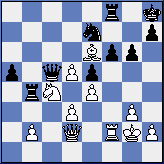 There was a 270-point upset when IM Greg "Samford and Son" Shahade blundered a pin tactic that probably isn't tough enough to make the next issue of White Belt. Julia Shiber, the lowest-rated player in the event, polished him off nicely after that. (Diagram, white to play and win.) Btw, if you go to the
There was a 270-point upset when IM Greg "Samford and Son" Shahade blundered a pin tactic that probably isn't tough enough to make the next issue of White Belt. Julia Shiber, the lowest-rated player in the event, polished him off nicely after that. (Diagram, white to play and win.) Btw, if you go to the 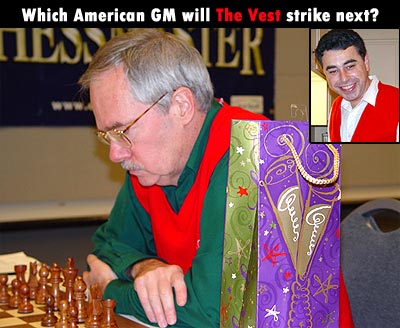
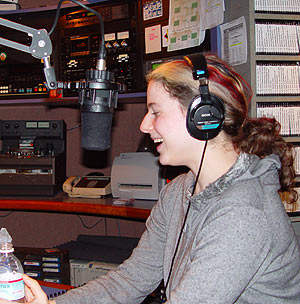 Hello from the great Northwest! Safely on the ground and with a DSL connection, what more could I ask? Tomorrow I'll be hanging out at the US Championship at the Seattle Center. Here's a pic of defending women's champ Jen Shahade taken this morning by chess photographer extraordinaire John Henderson, who has escaped the cold and rainy confines of his native Scotland for the cold and rain of Seattle working for America's Foundation for Chess. (They're the ones who are sponsoring and running the US Championship. The
Hello from the great Northwest! Safely on the ground and with a DSL connection, what more could I ask? Tomorrow I'll be hanging out at the US Championship at the Seattle Center. Here's a pic of defending women's champ Jen Shahade taken this morning by chess photographer extraordinaire John Henderson, who has escaped the cold and rainy confines of his native Scotland for the cold and rain of Seattle working for America's Foundation for Chess. (They're the ones who are sponsoring and running the US Championship. The 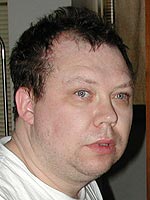 Yes, I know this pic is an abrupt change from the one of Jennifer Shahade I had up. No, this isn't the case for mandatory drug testing in chess. No, it's not the "after" photo from a case study on electro-shock therapy. It's John Henderson, press officer of the AF4C here in Seattle.
Yes, I know this pic is an abrupt change from the one of Jennifer Shahade I had up. No, this isn't the case for mandatory drug testing in chess. No, it's not the "after" photo from a case study on electro-shock therapy. It's John Henderson, press officer of the AF4C here in Seattle.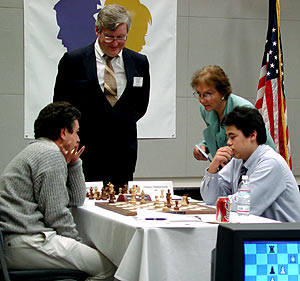 First it was FM Aaron Pixton to get a lesson on this rule he'll never forget. He was a pawn down against GM Serper and must have been delighted when Serper accidentally allowed a complicated repetition as they finished the first time control. Pixton made the move (42.Rf1) that repeated the position for the third time and then went to tell the arbiter. Ooops. The arbiters (Jonathan Berry and Carol Jarecki) ruled in favor of Pixton, awarding him a draw. Serper appealed and the committee was quickly assembled. They overruled the arbiters and the game continued. Serper won 20 moves later. A painful way to lose a half point for Pixton.
First it was FM Aaron Pixton to get a lesson on this rule he'll never forget. He was a pawn down against GM Serper and must have been delighted when Serper accidentally allowed a complicated repetition as they finished the first time control. Pixton made the move (42.Rf1) that repeated the position for the third time and then went to tell the arbiter. Ooops. The arbiters (Jonathan Berry and Carol Jarecki) ruled in favor of Pixton, awarding him a draw. Serper appealed and the committee was quickly assembled. They overruled the arbiters and the game continued. Serper won 20 moves later. A painful way to lose a half point for Pixton.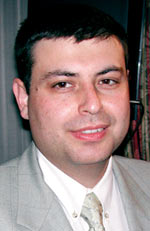 Israeli Grandmaster Boris Alterman is a friend of mine. We worked together at KasparovChess.com in Israel and for several years afterwards after I moved to New York. It was great to see him again now that he's here for the Kasparov-Deep Junior match. For several years now he has worked as 'trainer' to Junior, providing feedback to its programmers and tuning its opening book.
Israeli Grandmaster Boris Alterman is a friend of mine. We worked together at KasparovChess.com in Israel and for several years afterwards after I moved to New York. It was great to see him again now that he's here for the Kasparov-Deep Junior match. For several years now he has worked as 'trainer' to Junior, providing feedback to its programmers and tuning its opening book.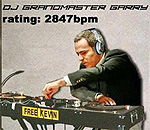 The entertaining high-traffic 'unusual news' linking site
The entertaining high-traffic 'unusual news' linking site 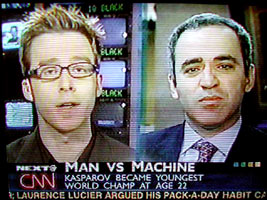 Garry Kasparov was on the CNN science and technology show today for a 5-8 minute interview about his match with Junior. It covered the usual territory about what it's like to play a machine, when will machines crush us all, etc.
Garry Kasparov was on the CNN science and technology show today for a 5-8 minute interview about his match with Junior. It covered the usual territory about what it's like to play a machine, when will machines crush us all, etc. 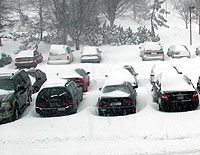 A full report is forthcoming on how the ChessNinja.com team first navigated the US Amateur Team East tournament in Parsippany, New Jersey this past weekend and then navigated their way through one of the worst snow storms ever to get home! Team Ninja scored 4-2, despite our best attempts to play like Alzheimer hamsters. At first it looked like I was okay after a six-year layoff from tournament chess. I started out with 3.5/4 on first board. But <random excuse generator tag> exhaustion set in </excuse> and I lost both of my games on the final day (although we won both matches thanks to teammates Rob Huntington, Alex Beltran, Mike Grant, and Jack Martin). It was a marvelous event and really what amateur chess is all about. A full report with annotated games, photos, and an incident about an ill-timed trip to the bathroom is coming soon.
A full report is forthcoming on how the ChessNinja.com team first navigated the US Amateur Team East tournament in Parsippany, New Jersey this past weekend and then navigated their way through one of the worst snow storms ever to get home! Team Ninja scored 4-2, despite our best attempts to play like Alzheimer hamsters. At first it looked like I was okay after a six-year layoff from tournament chess. I started out with 3.5/4 on first board. But <random excuse generator tag> exhaustion set in </excuse> and I lost both of my games on the final day (although we won both matches thanks to teammates Rob Huntington, Alex Beltran, Mike Grant, and Jack Martin). It was a marvelous event and really what amateur chess is all about. A full report with annotated games, photos, and an incident about an ill-timed trip to the bathroom is coming soon.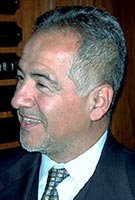 Argentine Grandmaster and chess promoter Miguel Quinteros was in New York during the Kasparov-Junior match. He told me it was just to see the match, but there were undoubtedly meetings about the WC. Miguel's reputation in Argentine chess circles rises and falls, but he probably deserves to be included with Campomanes and Keene if on a smaller scale.
Argentine Grandmaster and chess promoter Miguel Quinteros was in New York during the Kasparov-Junior match. He told me it was just to see the match, but there were undoubtedly meetings about the WC. Miguel's reputation in Argentine chess circles rises and falls, but he probably deserves to be included with Campomanes and Keene if on a smaller scale.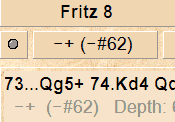 The fantastic battle between Leko and Kasparov in round three of Linares ended in a three-time repetition draw claim by Peter Leko. Surprisingly this apparently surprised Kasparov, who protested to the arbiter. But the arbiter verified the claim and announced the game drawn.
The fantastic battle between Leko and Kasparov in round three of Linares ended in a three-time repetition draw claim by Peter Leko. Surprisingly this apparently surprised Kasparov, who protested to the arbiter. But the arbiter verified the claim and announced the game drawn.
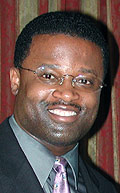 US GM Maurice Ashley has posted at TWIC a
US GM Maurice Ashley has posted at TWIC a 
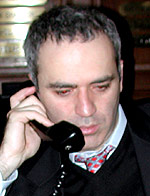 I spoke with Garry Kasparov on Tuesday, although much of the conversation was about Iraq. (He's pro regime change, as his upcoming article in the Wall St. Journal makes clear.) (Much more from Kasparov will be included in the next Mig on Chess at
I spoke with Garry Kasparov on Tuesday, although much of the conversation was about Iraq. (He's pro regime change, as his upcoming article in the Wall St. Journal makes clear.) (Much more from Kasparov will be included in the next Mig on Chess at 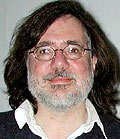 A follow-up on Kasparov's beauty prize tantrum at the Linares closing ceremony (DD 64). According to one of the subjects of Kasparov's wrath, Australian GM Ian Rogers, it was more violent than as presented in initial reports. His Sun-Herald
A follow-up on Kasparov's beauty prize tantrum at the Linares closing ceremony (DD 64). According to one of the subjects of Kasparov's wrath, Australian GM Ian Rogers, it was more violent than as presented in initial reports. His Sun-Herald 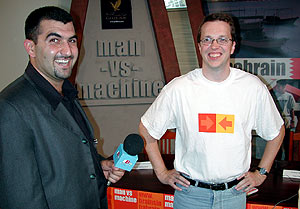 Many might take Short's subsequent lack of top ten status as proof that his lunge to the top was a fluke. And of course he was pummelled by Kasparov, as everyone predicted. But unless you were following the match you might only look at the lopsided score (12.5-7.5 and -5 after nine games) and not know that Short really put the heat on Kasparov in many games with white. (Much more than Anand did two years later.) Short attacked relentlessly and had several winning positions that he failed to convert.
Many might take Short's subsequent lack of top ten status as proof that his lunge to the top was a fluke. And of course he was pummelled by Kasparov, as everyone predicted. But unless you were following the match you might only look at the lopsided score (12.5-7.5 and -5 after nine games) and not know that Short really put the heat on Kasparov in many games with white. (Much more than Anand did two years later.) Short attacked relentlessly and had several winning positions that he failed to convert.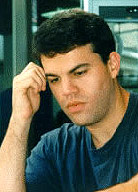 The 32-year-old Sherzer is, by all reports – including several chess people quoted in the news stories – the last person you could imagine doing such a thing. I do not know him personally, but he was a good friend of several friends and they spoke highly of him and recommended him for lessons and articles. (Photo from 1998.)
The 32-year-old Sherzer is, by all reports – including several chess people quoted in the news stories – the last person you could imagine doing such a thing. I do not know him personally, but he was a good friend of several friends and they spoke highly of him and recommended him for lessons and articles. (Photo from 1998.) 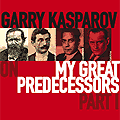 The
The 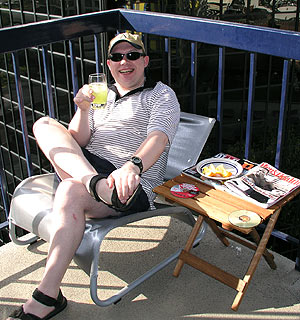 Seattle has become the home of Scottish chess journalist John Henderson, here pictured hard at work in his apartment.
Seattle has become the home of Scottish chess journalist John Henderson, here pictured hard at work in his apartment.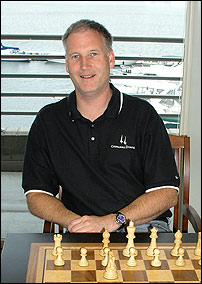 The Daily Dirt hasn't been daily lately but with good reason. I'm on the road and in the United States all chess roads run through
The Daily Dirt hasn't been daily lately but with good reason. I'm on the road and in the United States all chess roads run through 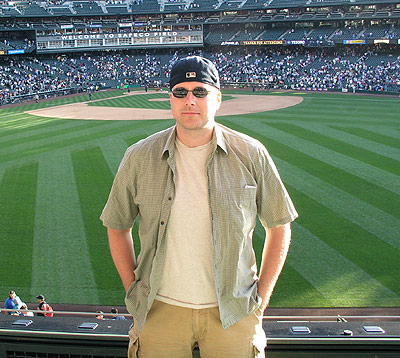 Here I am hard at work in Seattle after watching the Mariners beat the Atlanta Braves on a beautiful summer day.
Here I am hard at work in Seattle after watching the Mariners beat the Atlanta Braves on a beautiful summer day. 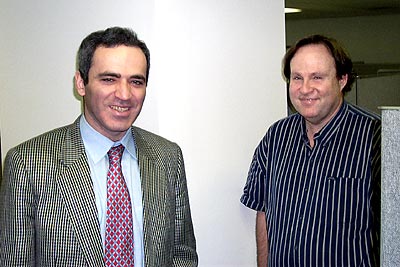 For more nostalgia, try this:
For more nostalgia, try this: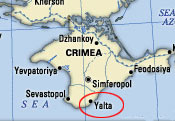 Mikhail Langer writes in: "Sport-Express (Russian sports daily) reports that Ponomariov and Kasparov received letters informing them that their match will take place in September in Yalta. The report also states that the official match anouncement is planned for late June - early July.
Mikhail Langer writes in: "Sport-Express (Russian sports daily) reports that Ponomariov and Kasparov received letters informing them that their match will take place in September in Yalta. The report also states that the official match anouncement is planned for late June - early July.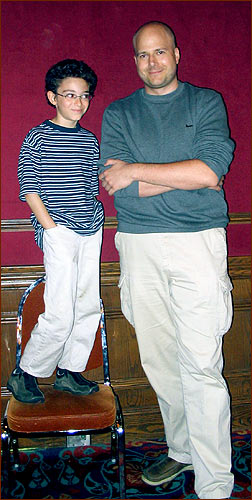 This priceless picture of 11-year-old American wunderkind Fabiano Caruana was taken by ChessNinja message board moderator (den mother) inky1 during the World Open. Fabiano is already a FIDE Master. We scored the same miserable number of points in the Open section in Philly (3/9) but he's on the way up while I'm neither a wunder nor a kinder!
This priceless picture of 11-year-old American wunderkind Fabiano Caruana was taken by ChessNinja message board moderator (den mother) inky1 during the World Open. Fabiano is already a FIDE Master. We scored the same miserable number of points in the Open section in Philly (3/9) but he's on the way up while I'm neither a wunder nor a kinder!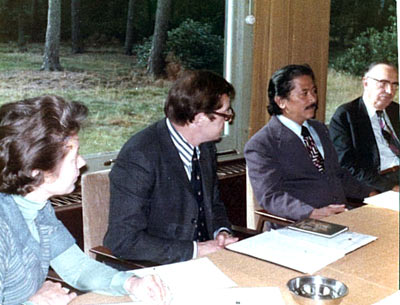
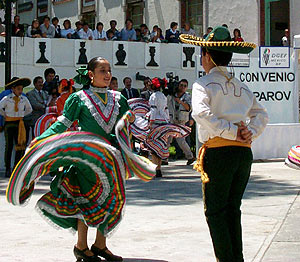 If you thought that chess already was a school subject in Russia,
If you thought that chess already was a school subject in Russia, 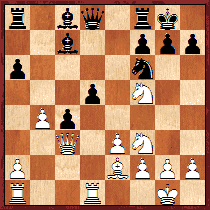 After starting out with 4/4 and an incredible performance rating at the Euro Club Cup, Garry Kasparov lost his round six game in 22 moves!! He had black in a complicated position against the Israeli Huzman and simply blundered a knight fork of king and queen. He bailed out, but that cost two pawns and he resigned.
After starting out with 4/4 and an incredible performance rating at the Euro Club Cup, Garry Kasparov lost his round six game in 22 moves!! He had black in a complicated position against the Israeli Huzman and simply blundered a knight fork of king and queen. He bailed out, but that cost two pawns and he resigned.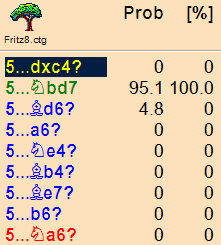
 Don't worry, she's still alive, but it's hard to imagine more being done to bury a player than what the US chess scene has seen this year regarding Hahn.
Don't worry, she's still alive, but it's hard to imagine more being done to bury a player than what the US chess scene has seen this year regarding Hahn. To continue with the Yanqui-centric theme of the week, the US Chess Federation
To continue with the Yanqui-centric theme of the week, the US Chess Federation  The statement published by Mig has stirred up quite a furor. Mig's article has brought to light, if abruptly and antagonistically to some, an unfortunate situation which has been going on quietly for over a year, and at last it must be resolved. No doubt, I am saddened and angered to have been at the center of this preposterous controversy.
The statement published by Mig has stirred up quite a furor. Mig's article has brought to light, if abruptly and antagonistically to some, an unfortunate situation which has been going on quietly for over a year, and at last it must be resolved. No doubt, I am saddened and angered to have been at the center of this preposterous controversy.  GM Sutovsky posted below: "Hi Mig, thanks for raising an issue. In fact, I signed the contract conditionally (''my confirmation is valid only if I am allowed to play all my matches in Malta''), but FIDE added my name to the list of confirmed players. I protested, they removed me from that list but didn't add to the list of those who refused. Suddenly, my name is just absent at all... But you could confidently enlist myself among those who refused to play in Libya :) Basically, according to the laws of Israel, I'm just not allowed to go there... So, Israeli players (Gelfand, me and Smirin - who is second reserve and would definitely get a place) are just ignored by FIDE and left out of KO. Quite an issue, isn't it?
GM Sutovsky posted below: "Hi Mig, thanks for raising an issue. In fact, I signed the contract conditionally (''my confirmation is valid only if I am allowed to play all my matches in Malta''), but FIDE added my name to the list of confirmed players. I protested, they removed me from that list but didn't add to the list of those who refused. Suddenly, my name is just absent at all... But you could confidently enlist myself among those who refused to play in Libya :) Basically, according to the laws of Israel, I'm just not allowed to go there... So, Israeli players (Gelfand, me and Smirin - who is second reserve and would definitely get a place) are just ignored by FIDE and left out of KO. Quite an issue, isn't it? 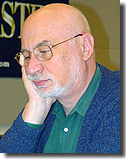 If someone was going to break the omerta around FIDE's decision to hold the world championship in Libya, Boris Gulko was a logical candidate. (GM Sutovsky and the USCF have
If someone was going to break the omerta around FIDE's decision to hold the world championship in Libya, Boris Gulko was a logical candidate. (GM Sutovsky and the USCF have 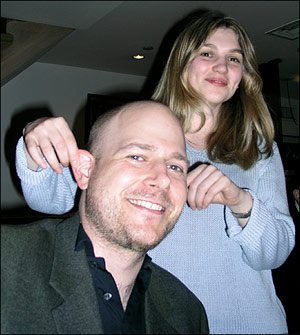 A
good reporter is always willing to make personal sacrifices to get the
story. With this in mind I forced myself to hang out with Almira Skripchenko,
Anna Hahn, and Irina Krush last Friday night. The occasion was the press
conference for the
A
good reporter is always willing to make personal sacrifices to get the
story. With this in mind I forced myself to hang out with Almira Skripchenko,
Anna Hahn, and Irina Krush last Friday night. The occasion was the press
conference for the 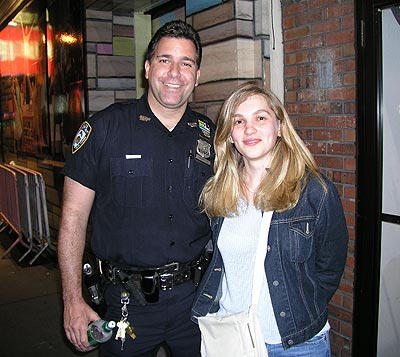
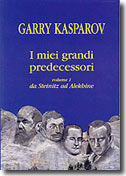 As mentioned below, Kasparov just finished a lightning-quick trip to Italy to promote his Great Predecessors book series. He set his new record for books signed in one day, 570! "They were organized like the Ferrari racing team," was how he put it. I stumbled into
As mentioned below, Kasparov just finished a lightning-quick trip to Italy to promote his Great Predecessors book series. He set his new record for books signed in one day, 570! "They were organized like the Ferrari racing team," was how he put it. I stumbled into 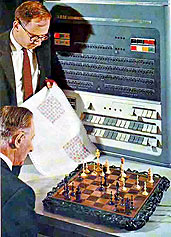 mack posted an interesting
mack posted an interesting 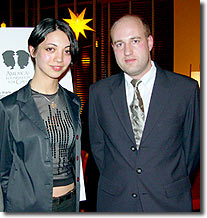 From Pittsburgh, Pennsylvania comes the announcement by US Champion Alexander Shabalov (pictured with women's champion Anna Hahn) that he will not travel to Libya for the 2004 FIDE World Championship. He writes,
From Pittsburgh, Pennsylvania comes the announcement by US Champion Alexander Shabalov (pictured with women's champion Anna Hahn) that he will not travel to Libya for the 2004 FIDE World Championship. He writes, 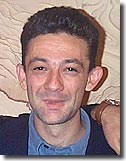 I still remember the look on Frenchman Olivier Touzane's 2368-rated face when he beat Vishy Anand with black in the first game of his round one match in the last FIDE KO in Moscow, 2001. (That's him on that very day on the left. The arm around him belongs to his fellow French representative Vlady Tkachiev.) It was a fun but short-lived celebration as Anand wiped him out the next day and then won the rapid tiebreak. Leko also lost a first-round game, to Watu Kobese.
I still remember the look on Frenchman Olivier Touzane's 2368-rated face when he beat Vishy Anand with black in the first game of his round one match in the last FIDE KO in Moscow, 2001. (That's him on that very day on the left. The arm around him belongs to his fellow French representative Vlady Tkachiev.) It was a fun but short-lived celebration as Anand wiped him out the next day and then won the rapid tiebreak. Leko also lost a first-round game, to Watu Kobese.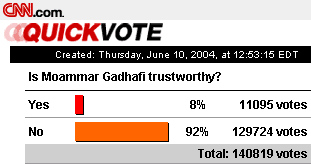
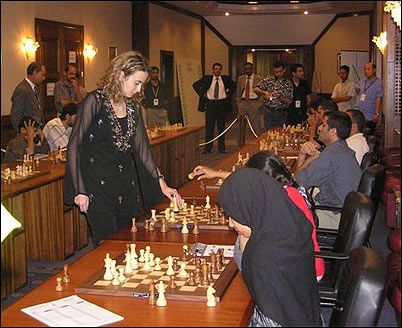
 UPDATE: We have posted
UPDATE: We have posted 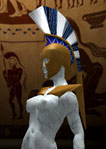 And with that tip of the hat to Mel Brooks... Oh what the hell, it's Friday.
And with that tip of the hat to Mel Brooks... Oh what the hell, it's Friday. 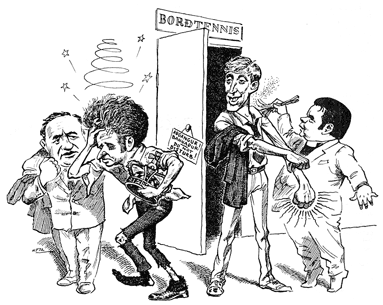
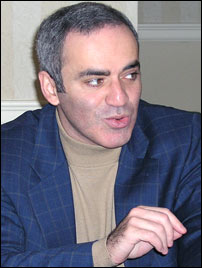 It was pretty informal, but I managed to get a few answers to
It was pretty informal, but I managed to get a few answers to 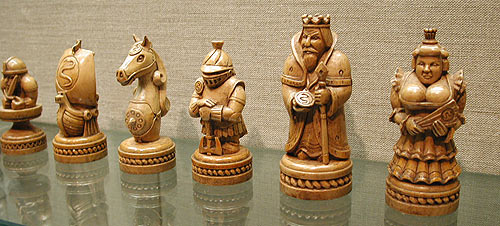
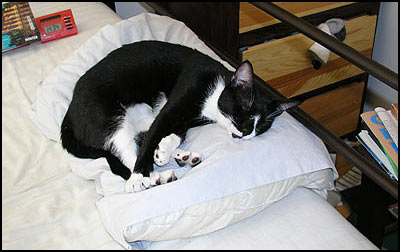
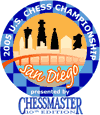

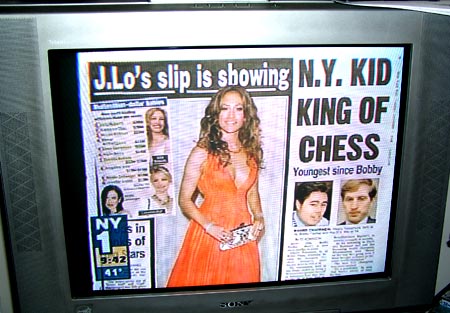
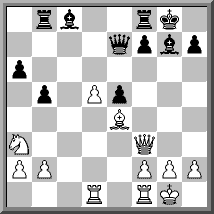 I was just looking at the round five games of the Petrosian Memorial Internet Championship. France upset Russia, with a little help from Alexander Khalifman's mouse, so it appears. In this position, popularized by Radjabov last year, Khalifman played the uninspiring 18...Rb7?? 19.d6 1-0. It's obvious he meant to play the normal move 18...Rb6. The
I was just looking at the round five games of the Petrosian Memorial Internet Championship. France upset Russia, with a little help from Alexander Khalifman's mouse, so it appears. In this position, popularized by Radjabov last year, Khalifman played the uninspiring 18...Rb7?? 19.d6 1-0. It's obvious he meant to play the normal move 18...Rb6. The 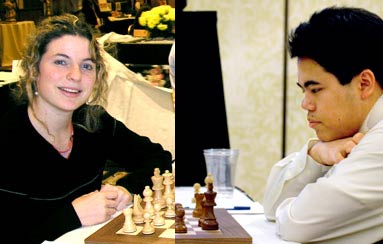
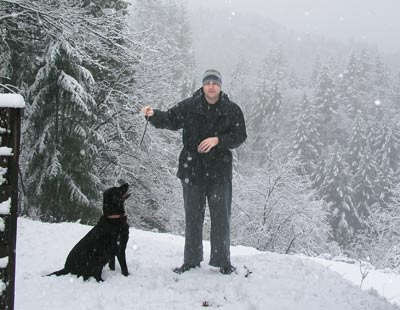
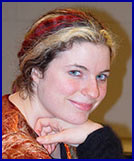 Before we get down to serious analysis, I want to give a couple shout-outs, first to "Chess Moms," a label and T-shirt slogan for the hyper moms of would-be prodigies. Now Judit Polgar is leading the way in changing the meaning of "Chess Mom." True, women do sometimes drop out of chess once they start families. But certainly there are no statistics to show that those who do stick with it play any worse.
Before we get down to serious analysis, I want to give a couple shout-outs, first to "Chess Moms," a label and T-shirt slogan for the hyper moms of would-be prodigies. Now Judit Polgar is leading the way in changing the meaning of "Chess Mom." True, women do sometimes drop out of chess once they start families. But certainly there are no statistics to show that those who do stick with it play any worse.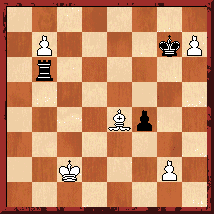 The
The 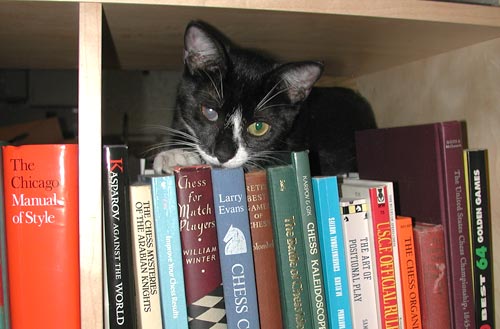
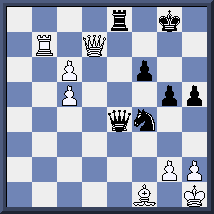 This is really
This is really 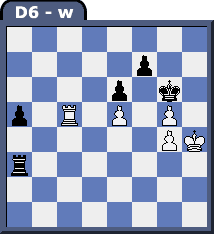 This is Vasquez-Ni Hua from Aeroflot. Black just played 41...Ra3. I annotated this endgame for the latest Black Belt and this position just has to be shared.
This is Vasquez-Ni Hua from Aeroflot. Black just played 41...Ra3. I annotated this endgame for the latest Black Belt and this position just has to be shared.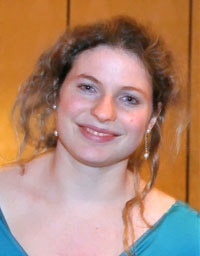 A few weeks ago I received an e-mail from GM Robert Fontaine asking if I'd like to participate in the "World Chess Beauty Contest."
A few weeks ago I received an e-mail from GM Robert Fontaine asking if I'd like to participate in the "World Chess Beauty Contest."
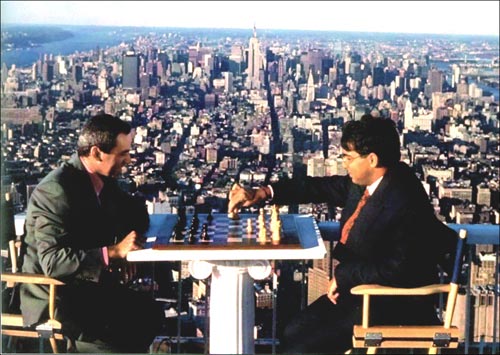
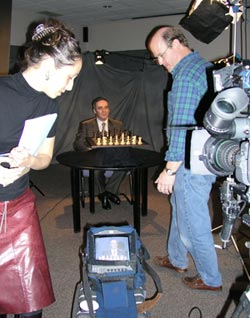 A profile of Garry Kasparov will run on ABC News with Peter Jennings tonight on ABC. It's the last piece of the show, so they said it should be on at around 6:50pm (EST). They did a 25-minute interview that will be chopped into 4-5 minutes. Of course Kasparov wants to talk politics but the producer kept asking about that darn chess thing he used to do.
A profile of Garry Kasparov will run on ABC News with Peter Jennings tonight on ABC. It's the last piece of the show, so they said it should be on at around 6:50pm (EST). They did a 25-minute interview that will be chopped into 4-5 minutes. Of course Kasparov wants to talk politics but the producer kept asking about that darn chess thing he used to do.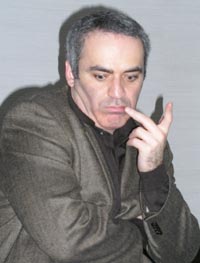 Saying "it is clear the chess world still needs me", Garry Kasparov today announced his return to professional chess. It remains to be seen if Kasparov can shake off the rust and be competitive again at his age.
Saying "it is clear the chess world still needs me", Garry Kasparov today announced his return to professional chess. It remains to be seen if Kasparov can shake off the rust and be competitive again at his age.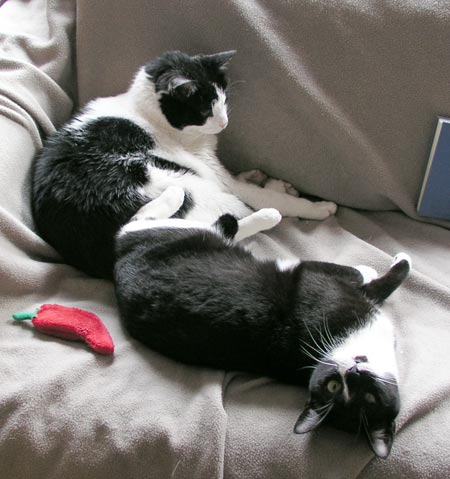
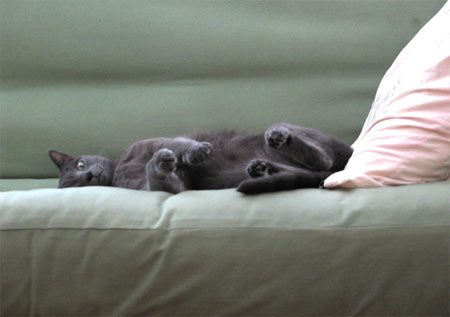
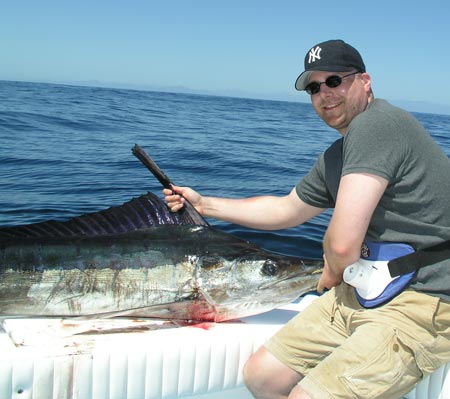
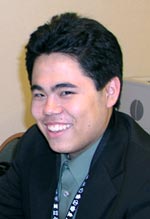 Before delving into the game, I am going to give a little bit of historical background. Malmo is a town in southern Sweden primarily known as a seaport. It is separated from Denmark by the Oresund Strait. However, in 1999 the two governments decided to build a bridge which connects Sweden and Denmark. I must say that although there wasn't much to see in Malmo; the weather was pleasant and there were plenty of hot chicks all around!
Before delving into the game, I am going to give a little bit of historical background. Malmo is a town in southern Sweden primarily known as a seaport. It is separated from Denmark by the Oresund Strait. However, in 1999 the two governments decided to build a bridge which connects Sweden and Denmark. I must say that although there wasn't much to see in Malmo; the weather was pleasant and there were plenty of hot chicks all around!
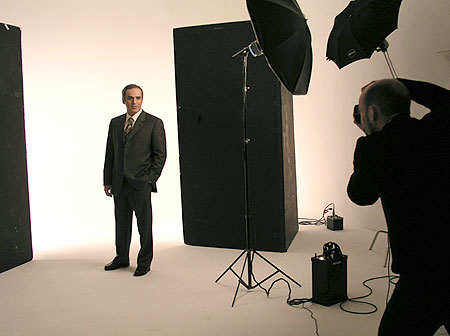
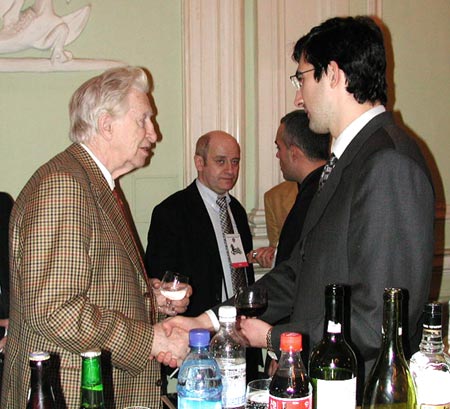

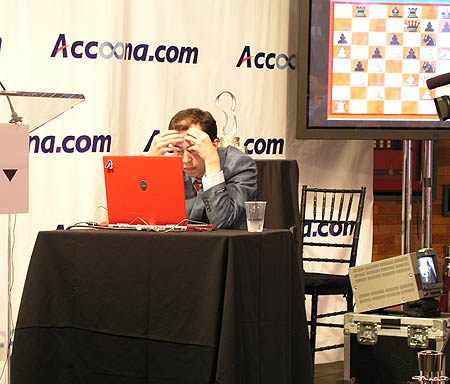
 I have an ever-increasing collection of found chess in advertising and other forms of media. Apart from the usual references and metaphors, the visual element is also appreciated by the marketing types. Here are two I saw in the last few weeks, a Citibank ad tile at the NY Times (where is that white pawn going?) and a sexy/sexist vertical banner ad for the adult-themed (!) site Nerve (where is that white queen going?!).
I have an ever-increasing collection of found chess in advertising and other forms of media. Apart from the usual references and metaphors, the visual element is also appreciated by the marketing types. Here are two I saw in the last few weeks, a Citibank ad tile at the NY Times (where is that white pawn going?) and a sexy/sexist vertical banner ad for the adult-themed (!) site Nerve (where is that white queen going?!).
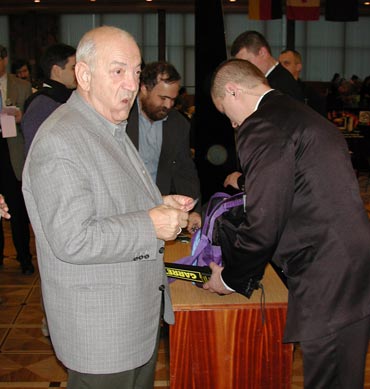
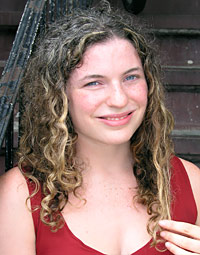 When Adams lost to Hydra 5.5-.5, one of the things that upset me the most was some of the commentary on the ICC. Hydra's brilliant combination at the end of the second game was not unveiled gradually in a dramatic way, but instantly cited by computer programs. This practice has always bothered me and my brother [IM Greg Shahade], who went as far as to instate a no-computer analysis rule on ICC coverage of the New York Masters.
When Adams lost to Hydra 5.5-.5, one of the things that upset me the most was some of the commentary on the ICC. Hydra's brilliant combination at the end of the second game was not unveiled gradually in a dramatic way, but instantly cited by computer programs. This practice has always bothered me and my brother [IM Greg Shahade], who went as far as to instate a no-computer analysis rule on ICC coverage of the New York Masters.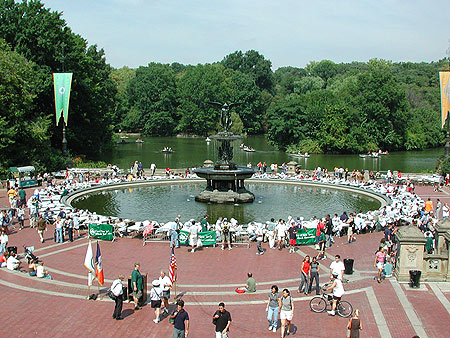
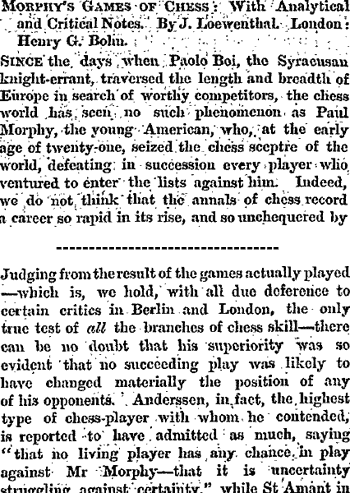
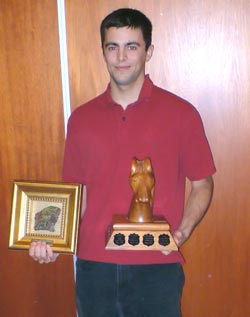 I am a graduate student in computer science at the University of Illinois at Urbana-Champaign (I live in Urbana). This is my first year. I already have an MS in Computer Engineering from Carnegie Mellon in Pittsburgh, home to Hitech & Deep Thought. I managed to take a class in parallel computing from
I am a graduate student in computer science at the University of Illinois at Urbana-Champaign (I live in Urbana). This is my first year. I already have an MS in Computer Engineering from Carnegie Mellon in Pittsburgh, home to Hitech & Deep Thought. I managed to take a class in parallel computing from 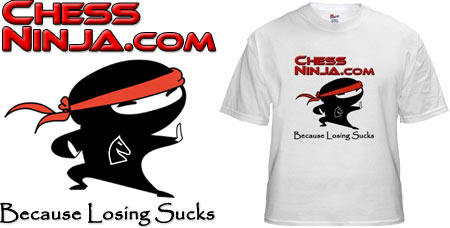
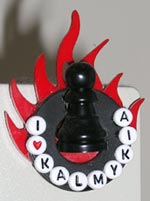 The World Chess Federation has reached an agreement with the leadership of the Khanty-Mansiysk Autonomous Region-Yugra in respect of the organisation of the 2005 World Chess Cup. The tournament will be taking place from 3 to 24 December 2005 with the total prize fund of USD 1,572,000. [On the 28th this was changed to Nov. 26 - Dec. 17 to accomodate the Russian Championship final.]
The World Chess Federation has reached an agreement with the leadership of the Khanty-Mansiysk Autonomous Region-Yugra in respect of the organisation of the 2005 World Chess Cup. The tournament will be taking place from 3 to 24 December 2005 with the total prize fund of USD 1,572,000. [On the 28th this was changed to Nov. 26 - Dec. 17 to accomodate the Russian Championship final.]
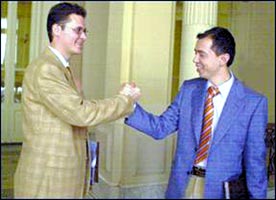 Veselin Topalov was first to arrive in San Luis, Argentina for the 2005
Veselin Topalov was first to arrive in San Luis, Argentina for the 2005 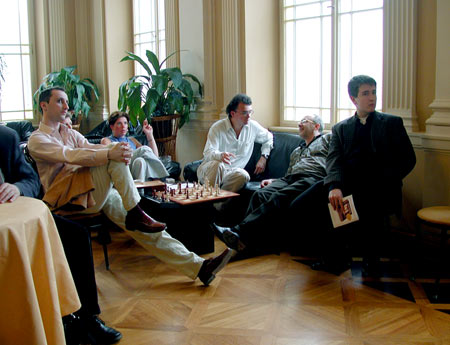
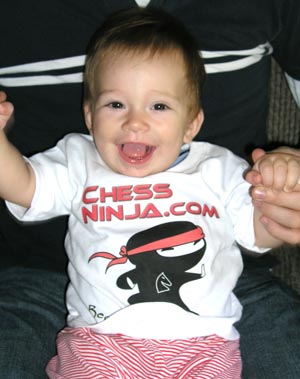 If you're interested in being rich and famous, send in your photo wearing/holding some of our spiffy
If you're interested in being rich and famous, send in your photo wearing/holding some of our spiffy 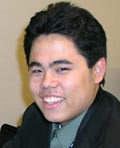 Hello everyone! It is rather discouraging to see the current state of chess in the United States. It is sad how ever since the golden days of Fischer the US has failed to produce any "superstar" chess players. By far and away the best US-produced players are probably Seirawan, Benjamin, Christiansen, and myself. What is the reason for this?
Hello everyone! It is rather discouraging to see the current state of chess in the United States. It is sad how ever since the golden days of Fischer the US has failed to produce any "superstar" chess players. By far and away the best US-produced players are probably Seirawan, Benjamin, Christiansen, and myself. What is the reason for this?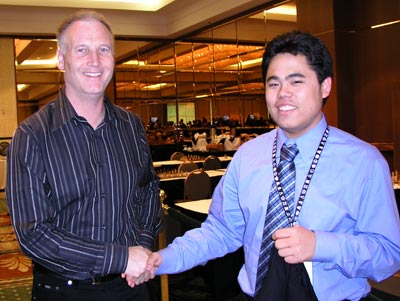
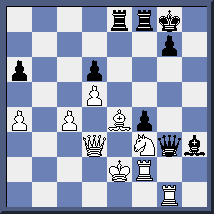 A knock-out, actually. Swiss #1 Vadim Milov scored a big upset in the
A knock-out, actually. Swiss #1 Vadim Milov scored a big upset in the 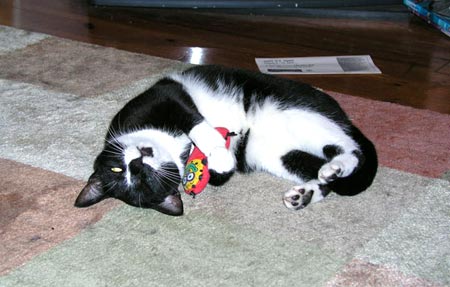


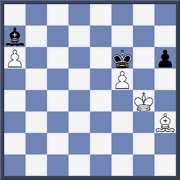 France Surrenders! Thanks so much to Bacrot for resigning and forcing us to look up and/or figure out the way to win that endgame position instead of playing it out. I know that the stronger side should win if the pawns are five files apart as they are here, but doesn't the black h-pawn change anything?
France Surrenders! Thanks so much to Bacrot for resigning and forcing us to look up and/or figure out the way to win that endgame position instead of playing it out. I know that the stronger side should win if the pawns are five files apart as they are here, but doesn't the black h-pawn change anything?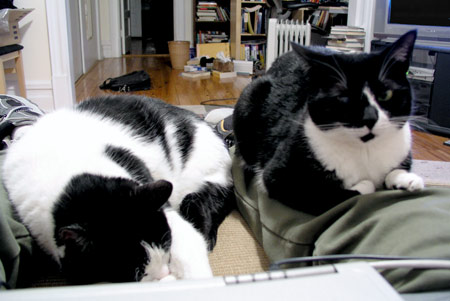
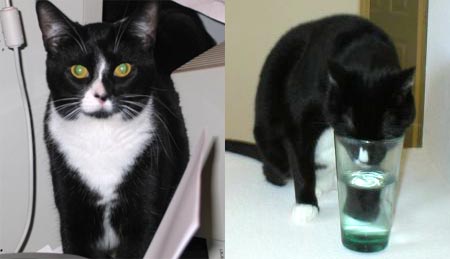
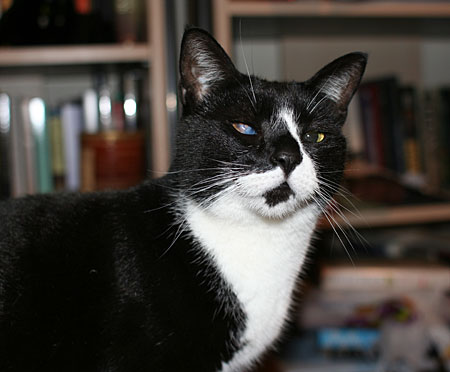
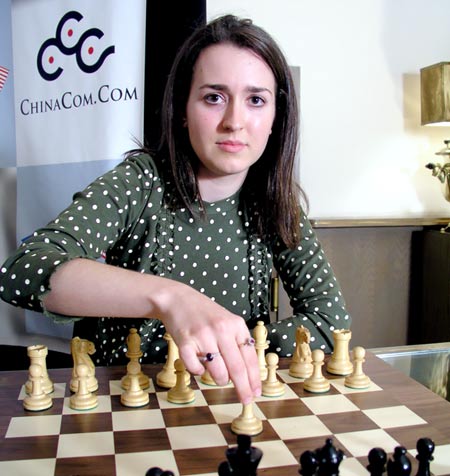


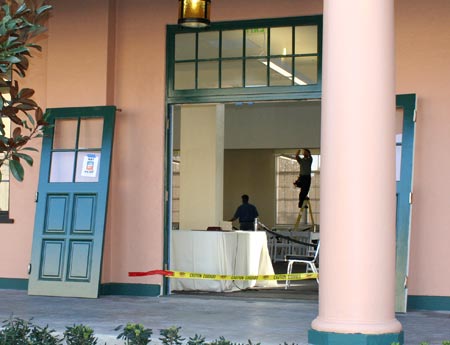
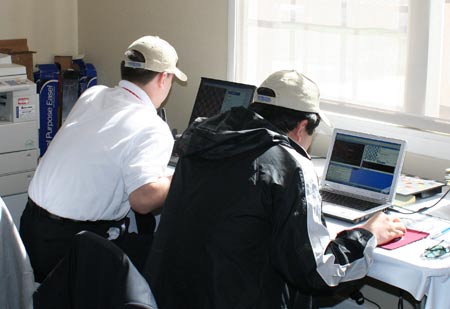
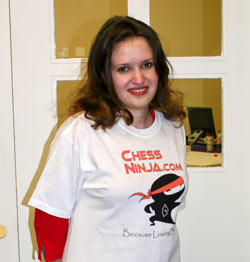 You can never please everyone, but between the three photo galleries, the blogs, and the daily reports there are several hundred photos now online at the
You can never please everyone, but between the three photo galleries, the blogs, and the daily reports there are several hundred photos now online at the 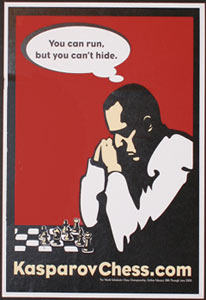 Got $1200 to spare for a Swedish chess poster for a French movie? Me neither. If you do,
Got $1200 to spare for a Swedish chess poster for a French movie? Me neither. If you do,  Gotta love this clip from a pic on a page put together by Anand's Indian management company, TNQ Sponsorship. Teen pics and a career highlights page included. The
Gotta love this clip from a pic on a page put together by Anand's Indian management company, TNQ Sponsorship. Teen pics and a career highlights page included. The 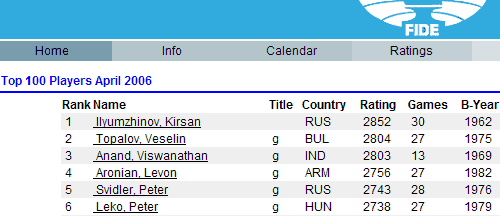
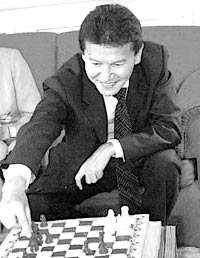 In a remarkable leap, FIDE president Kirsan Ilyumzhinov passed Vishy Anand and Veselin Topalov to take the #1 spot on the April, 2006 FIDE rating list that was released yesterday. His new rating of 2852 surpasses Topalov by an amazing 48 points and also overtakes Kasparov's record of 2851, achieved in 1999. This unprecedented Elo jump was due entirely to Ilyumzhinov's success in the little-publicized "Kalmykian Savings Bank Jubilee Tournament" held in Elista last November.
In a remarkable leap, FIDE president Kirsan Ilyumzhinov passed Vishy Anand and Veselin Topalov to take the #1 spot on the April, 2006 FIDE rating list that was released yesterday. His new rating of 2852 surpasses Topalov by an amazing 48 points and also overtakes Kasparov's record of 2851, achieved in 1999. This unprecedented Elo jump was due entirely to Ilyumzhinov's success in the little-publicized "Kalmykian Savings Bank Jubilee Tournament" held in Elista last November.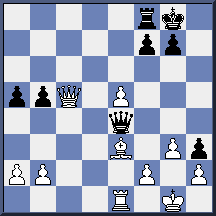 Seven of eleven rounds of
Seven of eleven rounds of 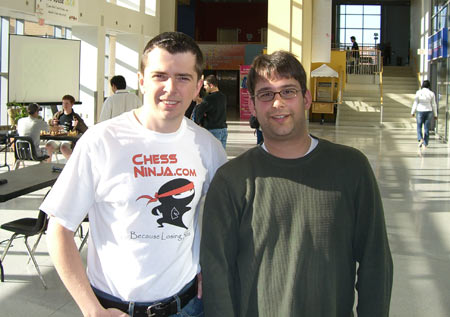
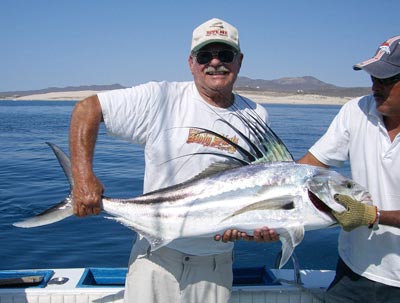
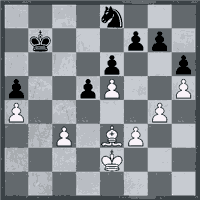 From game one, Topalov-Vallejo. Topalov missed a quick forced win with 40.Bxh6!
From game one, Topalov-Vallejo. Topalov missed a quick forced win with 40.Bxh6!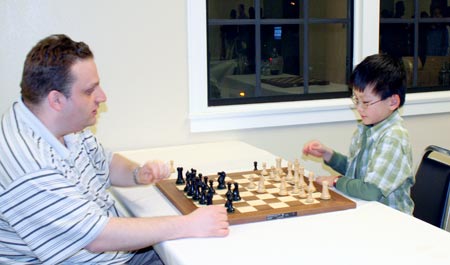
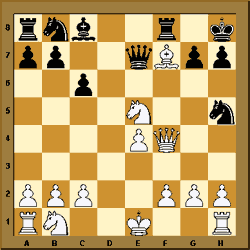
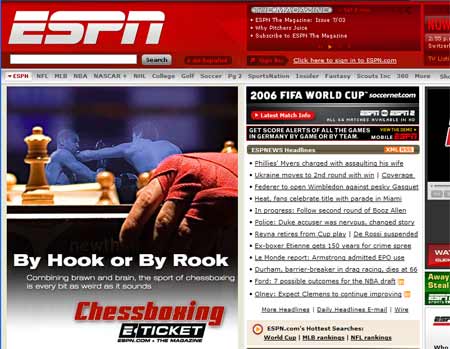
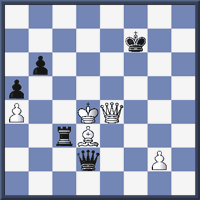 I'm not sure Shirov had great endgame winning chances against Areschenko in round ten, but 52.c5 hanging two pawns is as unlikely a super-GM blunder as you'll likely to see, although he saved the draw when Black apparently missed a forced win:
I'm not sure Shirov had great endgame winning chances against Areschenko in round ten, but 52.c5 hanging two pawns is as unlikely a super-GM blunder as you'll likely to see, although he saved the draw when Black apparently missed a forced win: 